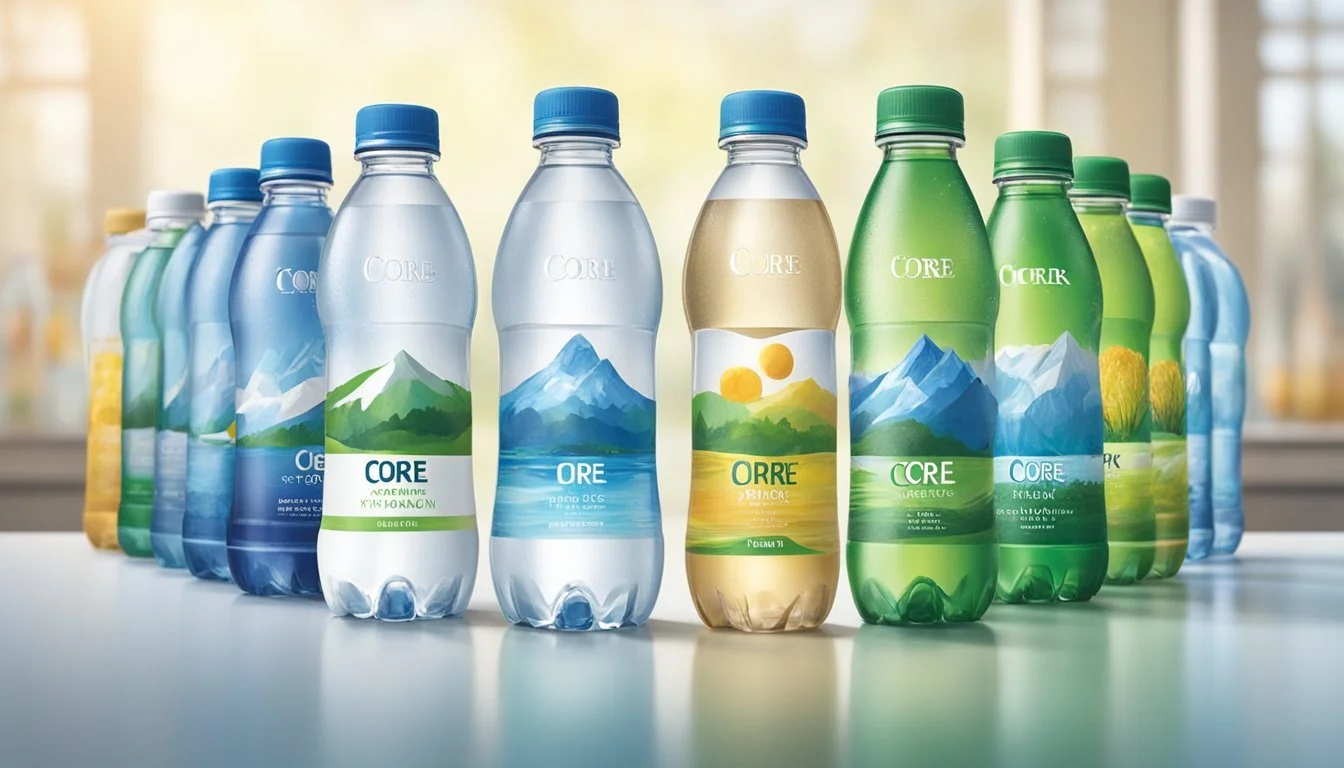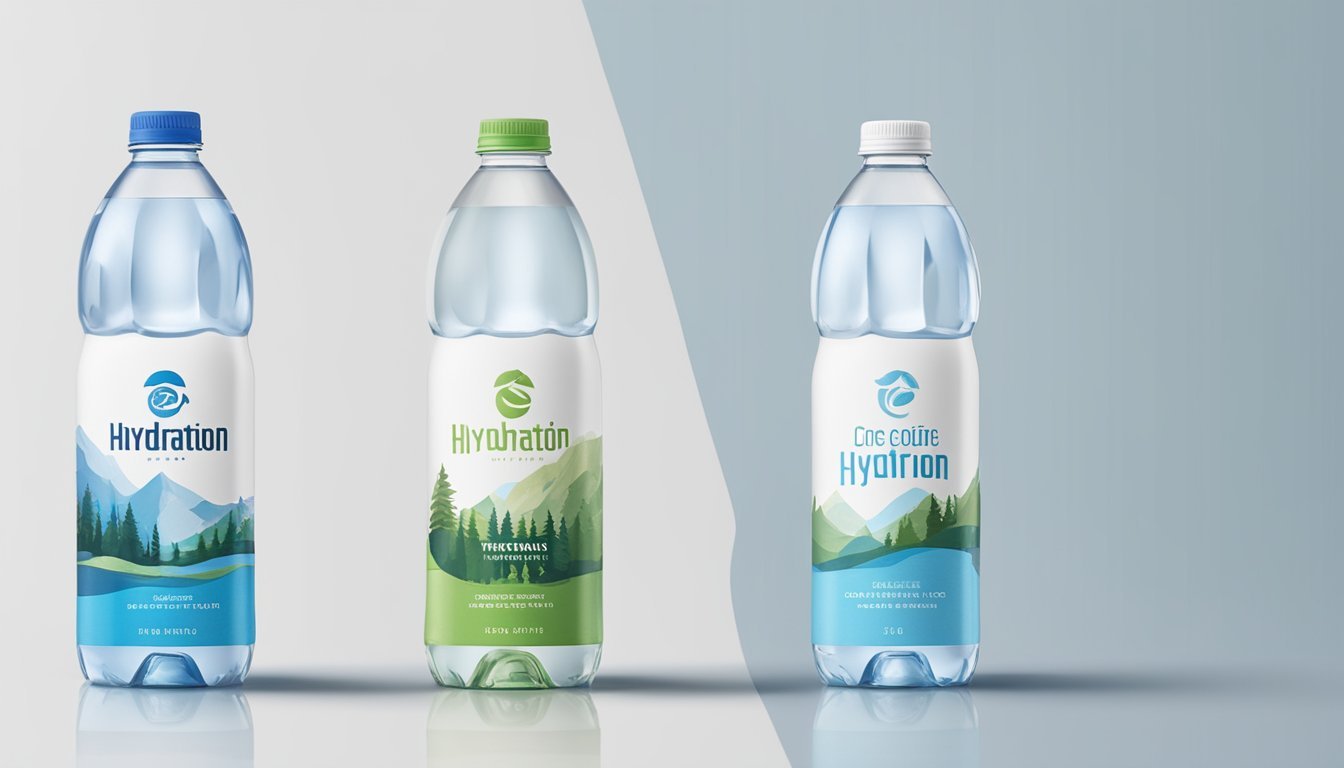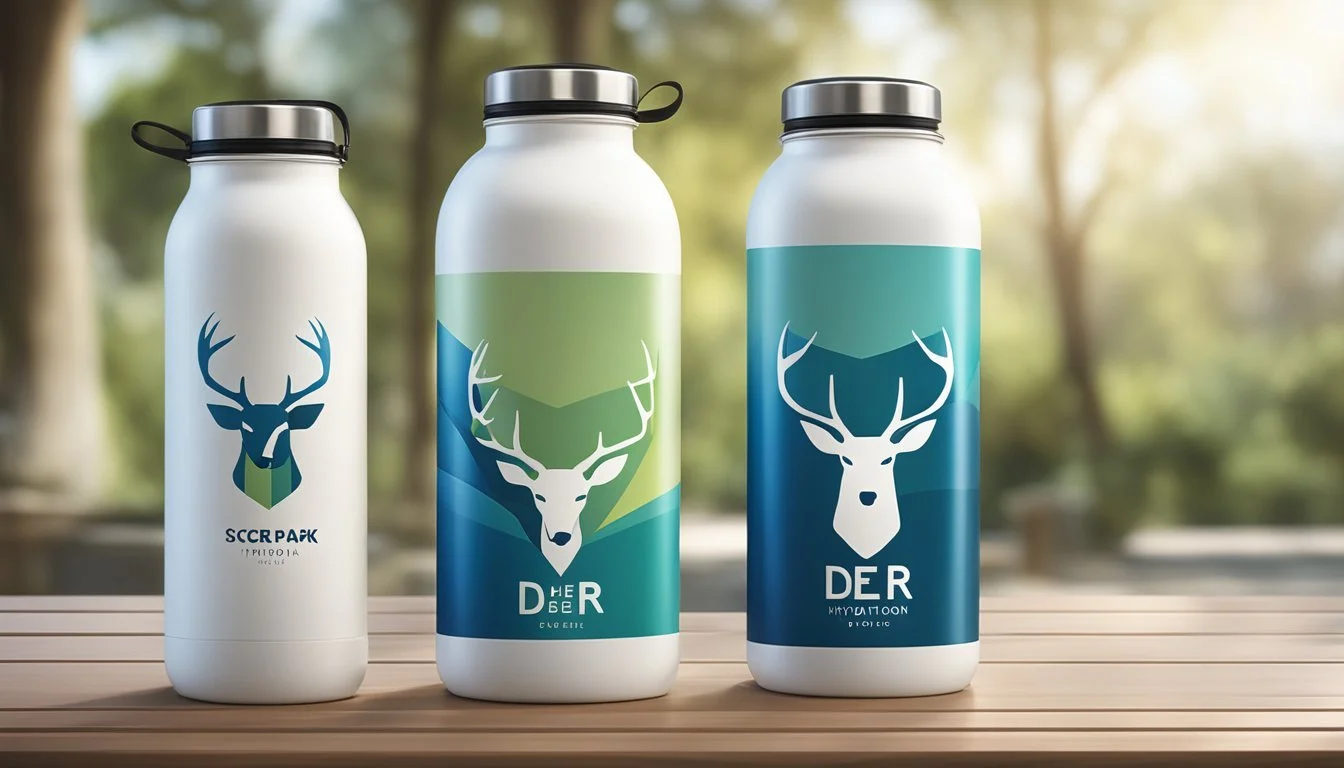Core Hydration vs. Deer Park
Unveiling the Superior Bottled Water Choice
Choosing the right bottled water brand can be a more nuanced decision than one might expect. On one hand, water enthusiasts may gravitate towards brands with a taste profile that suits their palate, while others may factor in aspects like mineral content, pH balance, and the source of the water. Among the myriad of options available, Core Hydration and Deer Park stand out, each with its defining qualities. Core Hydration boasts of a pH that matches the human body's natural balance, which is said to aid in optimal hydration. Deer Park, on the other hand, is sourced from natural springs across the Eastern Seaboard and is known for its crisp taste.
The bottled water market is highly competitive, and both Core Hydration and Deer Park have carved their niches by appealing to different segments. Consumers often scrutinize the purity of the water, the process by which it is filtered, and the presence of any added minerals or electrolytes that can enhance taste or nutritional value. Core Hydration emphasizes its ultra-purified water, which undergoes a rigorous filtration process, and includes electrolytes and minerals. Deer Park, with its commitment to 100% natural spring water, takes pride in offering a product without artificial additives, appealing to those seeking a more natural option.
With preferences varying widely, the choice between Core Hydration and Deer Park may come down to individual priorities, whether it’s the pH-balanced formulation of Core Hydration or the natural sourcing and taste profile of Deer Park. Each brand claims to provide a unique proposition to the consumer, promising not just hydration, but a refined drinking experience catered to different wants and needs. As the bottled water industry evolves, both brands adapt to consumer trends, continuously working to maintain their positions in the market.
Overview of Bottled Water
Bottled water is a staple in beverage consumption around the globe. Consumers opt for bottled waters for their convenience, perceived purity, and often for the taste. Several water brands line the shelves, ranging from basic to premium, each offering a unique selling point, whether it's the source of the water, added minerals, or the filtration process.
The market is saturated with options:
Natural spring waters: Touted for their minerals and unaltered composition.
Purified waters: These have undergone processes like reverse osmosis or distillation.
Enhanced waters: Often infused with electrolytes or flavors.
Notably, the purity of bottled water is a major concern for consumers. Brands like Core Hydration claim an ultra-purified status, with steps such as reverse osmosis and UV light treatment to ensure quality and taste. Others like Deer Park might promote their natural source and the minimal treatment to maintain the water's natural qualities.
Here's how some water brands differentiate themselves:
Brand Purification Process Unique Selling Point Core Hydration 7-step purification, including UV light Electrolytes for taste and hydration Deer Park Natural spring source Naturally occurring minerals
Consumers are increasingly mindful of the environmental impact of bottled water. The materials used for the bottles, such as plastics, and the water source sustainability are key considerations.
Health concerns also direct choices. Some reports have raised issues over contaminants like toxic PFAS chemicals, influencing brand trust and preferences. Marketing claims about health benefits and safety can be persuasive, yet they vary significantly across brands.
Brand Profiles
When choosing between bottled water brands, consumers often consider purity, added minerals, and the source of the water. Two brands that frequently come up in these discussions are Core Hydration and Deer Park, each with distinct purification processes and brand philosophies.
Core Hydration
Core Hydration is known for its ultra-purified water that is also balanced with electrolytes and minerals for taste. The brand touts a proprietary purification process known as Hydro-7™, which is designed to remove impurities and contaminants. Core Hydration's water maintains a neutral pH that is typically around 7.4, aligning with the human body's natural pH balance. Their product is aimed at providing not just hydration but also a clean and crisp taste that is free from sodium, chlorine, and fluorides.
Deer Park
On the other hand, Deer Park emphasizes its connection to nature with its 100% natural spring water. The brand sources its water from springs across the Eastern Seaboard of the United States. Their focus is on the purity and safety of spring water, bringing to consumers the natural minerals and a refreshing taste right from the source with minimal processing. Deer Park's commitment to natural water without artificial enhancements gives it a position in the market for those who prefer drinking water that is as close as possible to its original state.
Health and Hydration
When choosing between Core Hydration and Deer Park bottled water, consumers often consider the health impact and hydration efficiency. The body relies on water for every metabolic process, and adequate hydration supports overall health. Both brands meet the need for staying hydrated, but there are subtle differences to consider.
Core Hydration markets itself as ultra-purified water with electrolytes and minerals added for taste. The electrolytes can include potassium bicarbonate, calcium chloride, and magnesium chloride, which may aid in replenishing what is lost during physical activity. The presence of minerals is essential, as they support a variety of bodily functions and can improve the accompanying electrolyte balance.
Deer Park, offering 100% natural spring water, boasts a natural mineral content that varies depending on its source. Natural spring water inherently contains minerals, and proponents believe that natural sourcing provides a beneficial mineral makeup.
Water Brand Mineral Content Purpose Core Hydration Electrolytes added (e.g., potassium, calcium, magnesium) Enhance taste, aid in electrolyte replenishment Deer Park Naturally occurring minerals Provide health benefits from natural sources
Both brands provide hydration needs adequately without the presence of added sugars or artificial flavors, maintaining their commitment to promoting health. Staying hydrated with either choice is beneficial, yet consumers might have individual preferences based on the mineral content and its source.
Taste and Water Quality
When comparing the taste and water quality of Core Hydration to Deer Park bottled water, several factors come into play. These include the taste profiles, pH levels, mineral content, and the presence of any contaminants.
Taste Profiles
Core Hydration is known for its ultra-purified taste. It is designed to mimic the natural pH balance of the human body, aiming for a neutral and clean flavor. Deer Park, on the other hand, often has a taste that reflects its natural spring source, which can vary but often conveys a fresh and crisp flavor profile.
pH Levels and Balance
The pH level indicates the acidity or alkalinity of the water. Core Hydration boasts a pH that matches the body's natural pH, which is approximately 7.4. Deer Park's natural spring water has a different pH that can slightly vary, but the brand consistently reports a pH around 5.5, which is slightly more acidic than pure water.
Mineral Content Analysis
Mineral content is essential for the overall taste and health benefits of water. Core Hydration water includes electrolytes and minerals for taste, such as calcium, magnesium, and potassium. Deer Park, being sourced from springs, naturally contains a mix of minerals that contribute to its overall taste and electrolyte content.
Purity and Contaminants
Both brands employ rigorous purification processes. Core Hydration uses a proprietary seven-stage purification process, including ultraviolet exposure and reverse osmosis, ensuring purity. Deer Park subjects its natural spring water to filtration and purification standards to remove potential contaminants. Both brands meet the FDA's standards for bottled water, limiting exposure to contaminants such as heavy metals and PFAS chemicals.
Environmental Impact and Sustainability
When comparing Core Hydration and Deer Park bottled waters, it is pivotal to examine how each brand approaches environmental sustainability and the specific impacts of their products, from bottling to water source management. These aspects are critical given the increasing consumer concern for environmentally-friendly products.
Bottles and Packaging
Core Hydration prides itself on using 100% recyclable bottles that are made from a significant percentage of plant-based materials. Their bottles are also BPA-free, reducing potential health concerns associated with BPA plastics. On the other hand, Deer Park offers bottles that are 100% recyclable as well, with select products available in BPA-free bottles. Deer Park also actively encourages consumers to recycle through messaging on their labels.
Core Hydration Packaging:
100% recyclable
Plant-based materials used
BPA-free
Deer Park Packaging:
100% recyclable
Selected BPA-free options
Promotes consumer recycling behavior
Water Source Conservation
Core Hydration emphasizes that their water is sourced from domestic, sustainably-managed aquifers. As they extract the water, they maintain strict adherence to sustainability practices, aiming to minimize the environmental impact and preserve groundwater resources. Deer Park sources its natural spring water from carefully selected springs and places a strong emphasis on protecting these ecosystems. Both companies are committed to compliance with environmental regulations to ensure the conservation of natural water sources.
Core Hydration Water Source:
Sustainably-managed aquifers
Focus on minimal environmental impact
Groundwater conservation efforts
Deer Park Water Source:
Natural spring water sources
Protection of spring ecosystems
Conformity with environmental standards
The environmental sustainability of bottled water extends beyond the water itself to the life cycle of the bottle and the conservation efforts related to the water source. Each brand's commitment to sustainability and the reduction of their environmental footprint ultimately influences consumer choice.
Cost and Accessibility
When consumers are choosing between Core Hydration and Deer Park bottled water, price, and the ease of purchase are significant factors. These brands differ in cost-effectiveness and where they can be found for purchase.
Price Comparison
Core Hydration water is typically positioned as a premium water brand, reflecting a price point above that of Deer Park. Core's pricing reflects its electrolyte-enhanced formula and distinct pH balance, aimed at those seeking a particular hydration experience. Deer Park, often less expensive, is marketed towards consumers looking for natural spring water without additional enhancements.
Core Hydration:
Single bottle (20 oz): $2.00 - $2.50
Case (24 bottles, 20 oz each): $30.00 - $35.00
Deer Park:
Single bottle (20 oz): $1.00 - $1.50
Case (24 bottles, 20 oz each): $4.99 - $7.99
Prices may vary based on retail location and available discounts or promotions.
Availability
Deer Park water has a broader distribution footprint across the United States, particularly on the Eastern Seaboard. Its accessibility is a result of extensive distribution channels and the brand's longevity in the market. Consumers are likely to find Deer Park in most grocery stores, convenience stores, and mass retailers.
Core Hydration, although widely available across various states, may be less omnipresent than Deer Park, especially outside urban centers. Its specialty composition can often relegate it to higher-end supermarkets, health food stores, and gyms.
Where to find Deer Park:
Grocery stores
Convenience stores
Mass retailers
Where to find Core Hydration:
Specialty supermarkets
Health food stores
Gyms
Certifications and Standards
When considering bottled water options, certifications and adherence to standards guarantee safety and quality. Core Hydration and Deer Park both comply with various regulations and benchmarks in the industry.
Core Hydration asserts that it meets the U.S. Environmental Protection Agency’s (EPA) guidelines for water quality. The brand claims its product is purified through a seven-stage process, ensuring the water meets strict safety and purity standards. Additionally, Core Hydration indicates its bottling conforms to the standards set forth by the FDA, which is a common practice among reputable bottled water companies.
Deer Park, on the other hand, highlights its sourcing from natural springs and insists on adhering to rigorous safety protocols. This brand, manufactured by Nestlé, is subject to the company’s internal quality checks as well as external regulations. Deer Park complies with the International Bottled Water Association’s (IBWA) standards. This includes meeting or exceeding the FDA's bottled water quality standards.
Both brands are subject to routine testing for contaminants and consistency to maintain their certifications and satisfy consumer safety expectations. Below is a breakdown of their compliance with industry standards:
EPA Guidelines
Core Hydration: Complies via its seven-stage purification process
Deer Park: Adheres to standards, spring water tested for quality
FDA Regulations
Core Hydration: Meets all FDA requirements for bottled water
Deer Park: Nestlé's compliance extends to its Deer Park brand
IBWA Membership
Core Hydration: Membership not explicitly stated
Deer Park: Confirmed member, subjected to the IBWA's unannounced annual inspections
Both companies demonstrate a commitment to not only meeting but exceeding industry safety standards and certifications, reflecting their dedication to providing high-quality bottled water.
Consumer Insights and Preferences
When it comes to bottled water like Core Hydration and Deer Park, consumers display marked preferences influenced by quality, taste, and brand reputation. Market trends and customer reviews play significant roles in shaping these preferences.
Market Trends
The bottled water market is continuously shaped by consumer desires for both purity and convenience. Trends indicate a growing preference for products that offer health benefits, such as electrolyte-enhanced waters like Core Hydration, which is marketed as perfectly pH-balanced with electrolytes and minerals. On the other hand, brands like Deer Park, known for sourcing their water from natural springs, appeal to customers who prioritize natural purity. The demand for environmentally sustainable packaging is another trend steering consumer choices.
Core Hydration: Aligned with the wellness trend due to its pH and electrolyte content.
Deer Park: Appeals to customers looking for natural spring water with a long-standing brand reputation.
Customer Reviews and Ratings
Customers often consult reviews and ratings before making purchasing decisions. Deer Park and Core Hydration both have their loyalists and detractors. Ratings generally reflect customer satisfaction with the taste, which tends to be subjective, and the perceived value of the water.
Core Hydration has mixed reviews; some consumers appreciate the clean taste and pH benefits, while others do not find it distinguishable enough to justify the price point.
Deer Park receives positive feedback for its natural taste, but some reviews cite concerns about the plastic bottles it comes in.
Consumer insight data suggests these factors guide purchasing behavior:
Taste: Consumers show individual preferences; some favor the enhanced taste of additives, while others prefer the natural taste of spring water.
Brand Reputation: Long-established brands like Deer Park usually have a dedicated customer base, while newer entries like Core Hydration seek to disrupt the market with unique selling propositions.
Environment: The impact of packaging on the environment influences consumer choices, increasingly leading them to brands with sustainable practices.
Conclusion
When comparing Core Hydration and Deer Park, consumers typically consider factors such as taste, purity, pH balance, mineral content, and packaging when selecting their preferred bottled water.
Core Hydration is renowned for its ultra-purified water, boasting a pH that is perfectly balanced to match the body's natural pH level. This water is also enhanced with electrolytes and minerals for taste. Its bottle design is distinct with a contoured shape for a comfortable grip.
Deer Park, on the other hand, is a natural spring water, which many appreciate for its straightforwardness and commitment to sustainability. Deer Park's source is the key to its fresh taste and its bottles are made with recycled plastic, emphasizing environmental responsibility.
Aspect Core Hydration Deer Park Source Ultra-purified Natural spring water pH level Matches body's pH Varies naturally Taste Enhanced with electrolytes Natural Environmental Note - Recycled plastic used
Each brand has carved out its own space in the bottled water market. Consumers may lean towards Core Hydration for its pH balance and mineral enhancement or Deer Park for its natural sourcing and eco-friendly approach. Choice often boils down to personal preference and values.
Both Core Hydration and Deer Park offer unique qualities that have cemented their places in the market. They do not compromise on safety and adhere to the standards set for bottled waters. It is important to consider individual hydration needs and preferences alongside environmental impact when making a choice.







